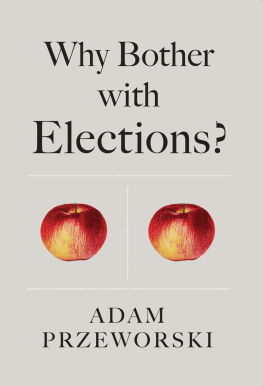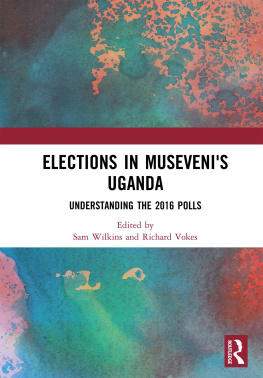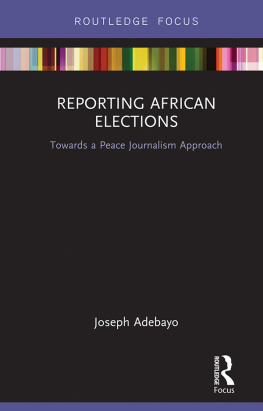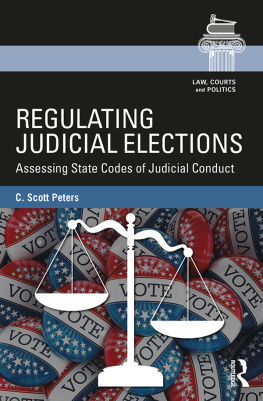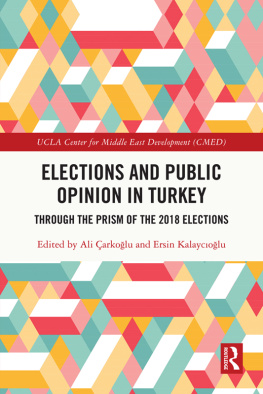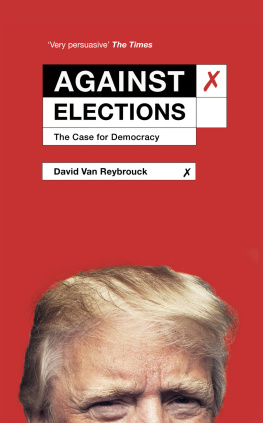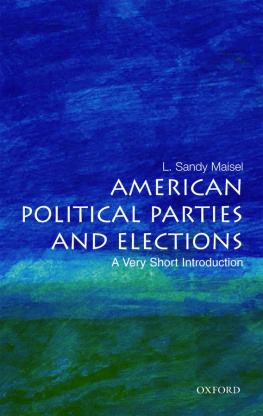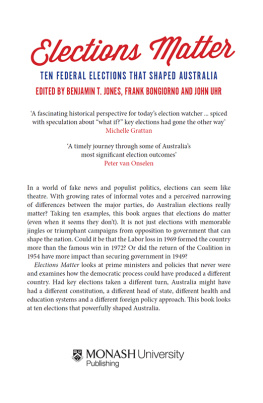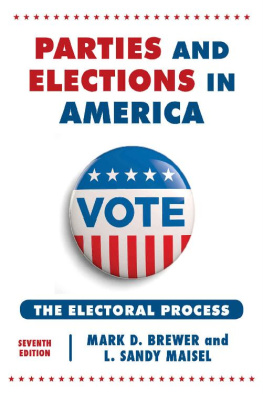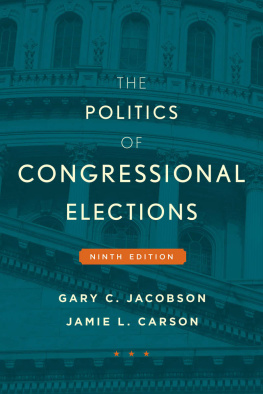Contents
List of Figures
Guide
Pages

Why Bother with Elections?
Adam Przeworski
polity
Copyright Adam Przeworski 2018
The right of Adam Przeworski to be identified as Author of this Work has been asserted in accordance with the UK Copyright, Designs and Patents Act 1988.
First published in 2018 by Polity Press
Polity Press
65 Bridge Street
Cambridge CB2 1UR, UK
Polity Press
101 Station Landing, Suite 300
Medford, MA 02155, USA
All rights reserved. Except for the quotation of short passages for the purpose of criticism and review, no part of this publication may be reproduced, stored in a retrieval system or transmitted, in any form or by any means, electronic, mechanical, photocopying, recording or otherwise, without the prior permission of the publisher.
ISBN-13: 978-1-5095-2663-5
A catalogue record for this book is available from the British Library.
Library of Congress Cataloging-in-Publication Data
Names: Przeworski, Adam, author.
Title: Why bother with elections? / Adam Przeworski.
Description: Cambridge, UK ; Medford, MA, USA : Polity Press, [2018] | Includes bibliographical references and index.
Identifiers: LCCN 2017023458 (print) | LCCN 2017052210 (ebook) | ISBN 9781509526628 (Mobi) | ISBN 9781509526635 (Epub) | ISBN 9781509526598 (hardback) | ISBN 9781509526604 (pbk.)
Subjects: LCSH: Elections. | Politics, Practical. | Political culture. | Representative government and representation.
Classification: LCC JF1001 (ebook) | LCC JF1001 .P78 2018 (print) | DDC 324.6--dc23
LC record available at https://lccn.loc.gov/2017023458
The publisher has used its best endeavours to ensure that the URLs for external websites referred to in this book are correct and active at the time of going to press. However, the publisher has no responsibility for the websites and can make no guarantee that a site will remain live or that the content is or will remain appropriate.
Every effort has been made to trace all copyright holders, but if any have been inadvertently overlooked the publisher will be pleased to include any necessary credits in any subsequent reprint or edition.
For further information on Polity, visit our website: politybooks.com
Preface
This book is a summary of our current collective understanding of the method by which some societies decide who would govern them and how: elections. While I rely heavily on my own research, I draw extensively on work of others. Because the book is intended to be accessible to the general educated public, I dispose with the usual academic etiquette, which consists of acknowledging the source of every idea and every fact. I decided to provide sources of direct quotes but not to reference the origins of other inspirations. Hence, I owe an apology to those of my colleagues who will recognize themselves as authors of ideas anonymously presented below.
Collective understanding does not mean that scholars studying elections agree on everything. I try to report differences of views and beliefs, as well as aspects of elections about which we are not clear, but I am certain that some people will still disagree with some of what follows. Hence, the reader is urged to read this book critically, forming opinions of his or her own.
For comments on earlier drafts I owe gratitude to John Dunn, Roberto Gargarella, Fernando Limongi, Zhaotian Luo, Bernard Manin, Pasquale Pasquino, and Ruben Ruz-Rufino, as well as to three anonymous reviewers.
Introduction
We select our governments through elections. Parties propose policies and present candidates, we vote, someone is declared winner according to pre-established rules, the winner moves into the government office and the loser goes home. Glitches do sometimes occur but mostly the process works smoothly. We are governed for a few years and then have a chance to decide whether to retain the incumbents or throw the rascals out. All of this is so routine that we take it for granted.
As familiar as this experience is, elections are a perplexing phenomenon. In a typical election about one in two voters ends up on the losing side. In presidential systems the winner rarely receives much more than 50 percent of the vote and in parliamentary multi-party systems the largest share is rarely higher than 40 percent. Moreover, many people who voted for the winners are dismayed with their performance in office. So most of us are left disappointed, either with the outcome or with the performance of the winner. Yet, election after election, most of us hope that our favorite candidate will win the next time around and will not disappoint. Hope and disappointment, disappointment and hope: something is strange. The only analogy I can think of is sport: my soccer team, Arsenal, has not won the championship in many years but every new season I still hope it will. After all, in other realms of life we adjust our expectations on the basis of past experience. But not in elections. The siren song of elections is just irresistible. Is it irrational?
Questions concerning the value of elections as a mechanism by which we collectively choose who will govern us and how they will do it have become particularly urgent in the last few years. In many democracies large numbers of people feel that elections only perpetuate the rule of establishment, elites, or even caste (casta in the language of the Spanish Podemos party), while at the other extreme many are alarmed by the rise of populist, xenophobic, repressive, and often racist, parties. These attitudes are intensely held on both sides, generating deep divisions, polarization, and are interpreted by various pundits as a crisis of democracy or at least as a sign of dissatisfaction with the very institution of elections. Survey results show that people in general and young people in particular now consider it less essential than in the past to live in a country that is governed democratically all of which supports the claim that democracy is in crisis (Foa and Mounk 2016).
Yet there is nothing undemocratic about the electoral victory of Donald Trump or the rise of anti-establishment parties in Europe. It is even more paradoxical to claim the same about results of various referendums, whether about Brexit or about constitutional reform (but implicitly Europe) in Italy: referendums are supposed to be an instrument of direct democracy, regarded by some as superior to representative democracy. Moreover, while the label of fascist is carelessly brandished to stigmatize these political forces, such parties, unlike those of the 1930s, do not advocate replacing elections by some other way of selecting rulers. They may be seen as ugly most people view racism and xenophobia as ugly but these parties do campaign under the slogan of returning to the people the power usurped by elites, which they see as strengthening democracy. In the words of a Trump advertisement: Our movement is about replacing a failed and corrupt political establishment with a new government controlled by you, the American people (). Marine Le Pen promised to call for a referendum on Europe, in which you, the people, will decide. They are not anti-democratic. Moreover, there is nothing anti-democratic about people wanting to have a strong or competent and effective government responses to survey questions, which have increased in frequency during recent years and which some commentators interpret as a symptom of declining support for democracy. Schumpeter (1942) certainly wanted governments to be able to govern and to govern competently, and I do not see why other democrats would not.

